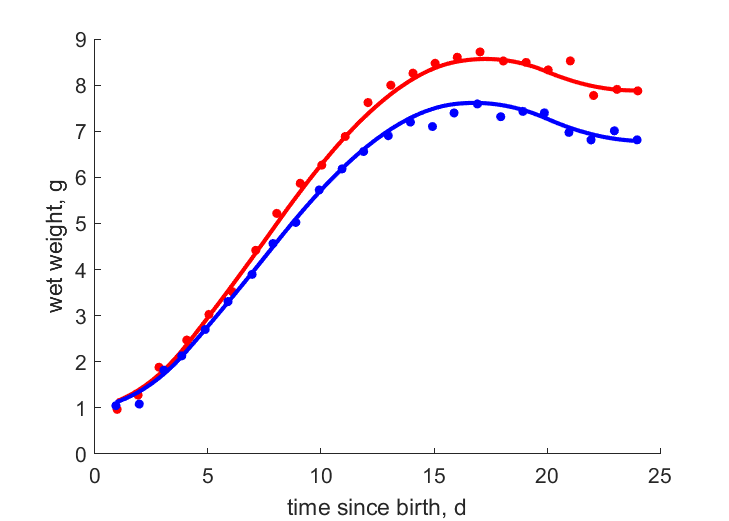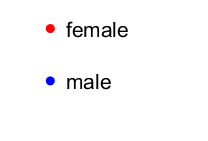Predictions & Data for this entry
| Model: std | climate: Cfb | migrate: | phylum: |
| COMPLETE = 2.5 | ecozone: TAz | food: biCii | class: |
| MRE = 0.010 | habitat: 0iTf | gender: Dg | order: |
| SMSE = 0.000 | embryo: Tnwfm, Tntfm | reprod: O | family: |
Zero-variate data
| Data | Observed | Predicted | (RE) | Unit | Description | Reference |
|---|---|---|---|---|---|---|
| ab | 20 | 19.64 | (0.01805) | d | age at birth | Sher1985 |
| tx | 24 | 24.02 | (0.0006333) | d | time since birth at fledging | Sher1985 |
| tp | 72 | 71.62 | (0.005278) | d | time since birth at puberty | guess |
| tR | 365 | 365 | ( 0) | d | time since birth at 1st brood | Sher1985 |
| am | 3650 | 3652 | (0.000435) | d | life span | guess |
| Wwb | 1 | 1.004 | (0.004145) | g | wet weight at birth | Sher1985 |
| Wwi | 7 | 7.111 | (0.01585) | g | ultimate wet weight for female | Sher1985 |
| Wwim | 5.6 | 5.543 | (0.01009) | g | ultimate wet weight for male | Sher1985 |
| Ri | 0.01644 | 0.01645 | (0.0004772) | #/d | maximum reprod rate | Wiki |
Uni- and bivariate data
| Data | Figure | Independent variable | Dependent variable | (RE) | Reference |
|---|---|---|---|---|---|
| tW_f |   | time since birth | wet weight | (0.01935) | Sher1985 |
| tW_m |   | time since birth | wet weight | (0.01808) | Sher1985 |
Pseudo-data at Tref = 20°C
| Data | Generalised animal | Acanthisitta chloris | Unit | Description |
|---|---|---|---|---|
| v | 0.02 | 0.0193 | cm/d | energy conductance |
| p_M | 18 | 492 | J/d.cm^3 | vol-spec som maint |
| k_J | 0.002 | 0.02005 | 1/d | maturity maint rate coefficient |
| k | 0.3 | 0.2984 | - | maintenance ratio |
| kap | 0.8 | 0.6862 | - | allocation fraction to soma |
| kap_G | 0.8 | 0.8002 | - | growth efficiency |
| kap_R | 0.95 | 0.95 | - | reproduction efficiency |
Discussion
- males are assumed to differ from females by {p_Am} only
- nestlings exceed mean adult weight at day 10 for males and 11 for females; f > 1 had been allowed to accomodate this pattern
- body temperature has been guessed
- mod_1: v is reduced and food availability is taken variable in tW data
- mod_2: males have equal state variables at b, compared to females
- mod_3: Pseudo-data point k is used, rather than k_J; Data set tp and parameter t_R are added, the latter replacing clutch interval t_N. Postnatal T is based on PrinPres1991, see get_T_Aves. See further the revision page, theme puberty
Facts
- Helpers for caring nestlings are frequently around (Ref: Sher1985)
- Males spend half as much time in incubation than females, spend equal time in brooding nestlings (12 d period), but contribute more to feeding nestlings; (Ref: Sher1985)
Bibliography